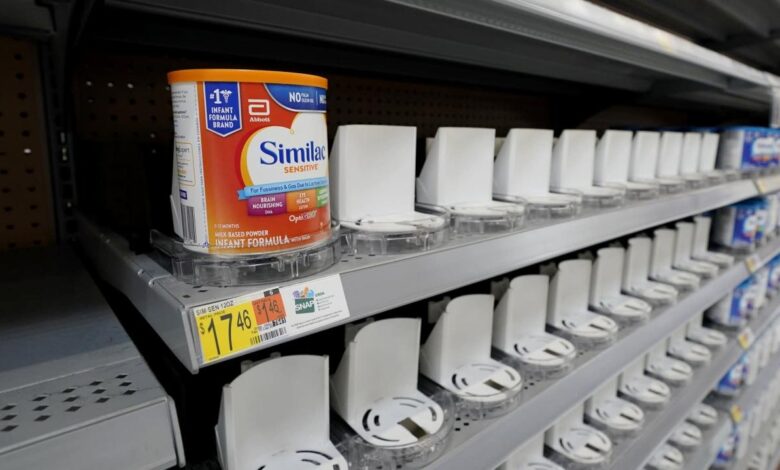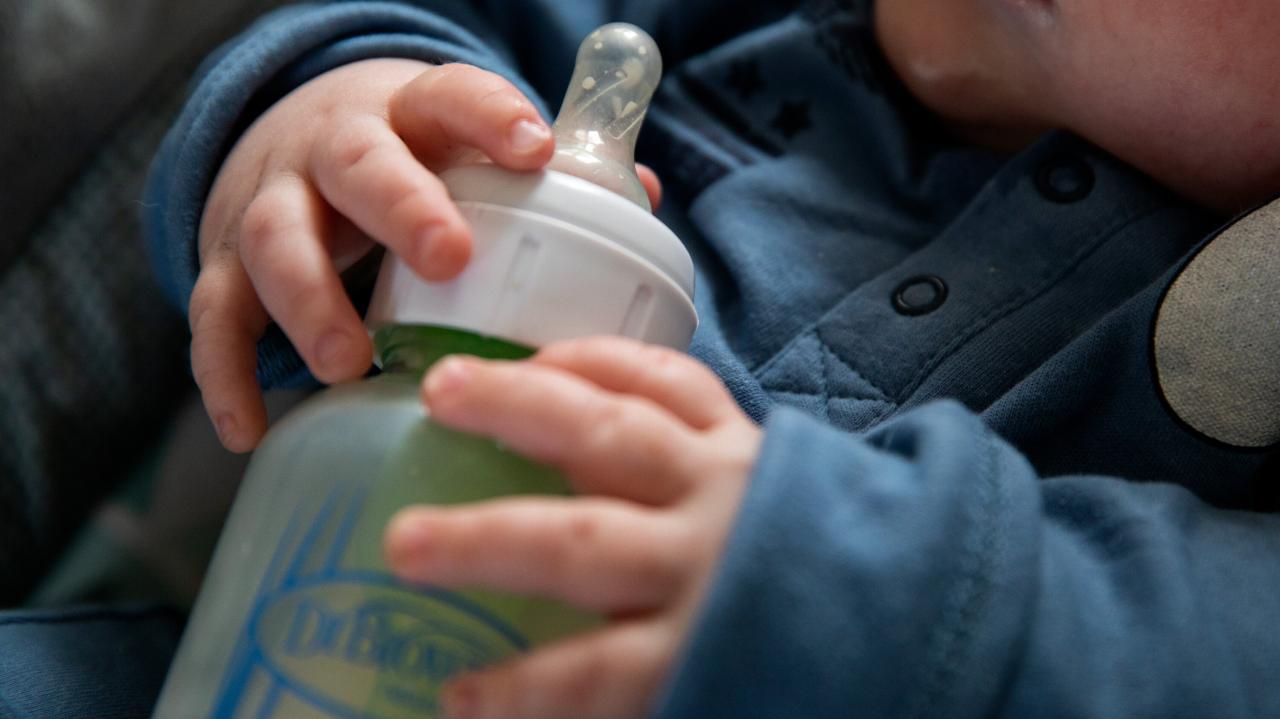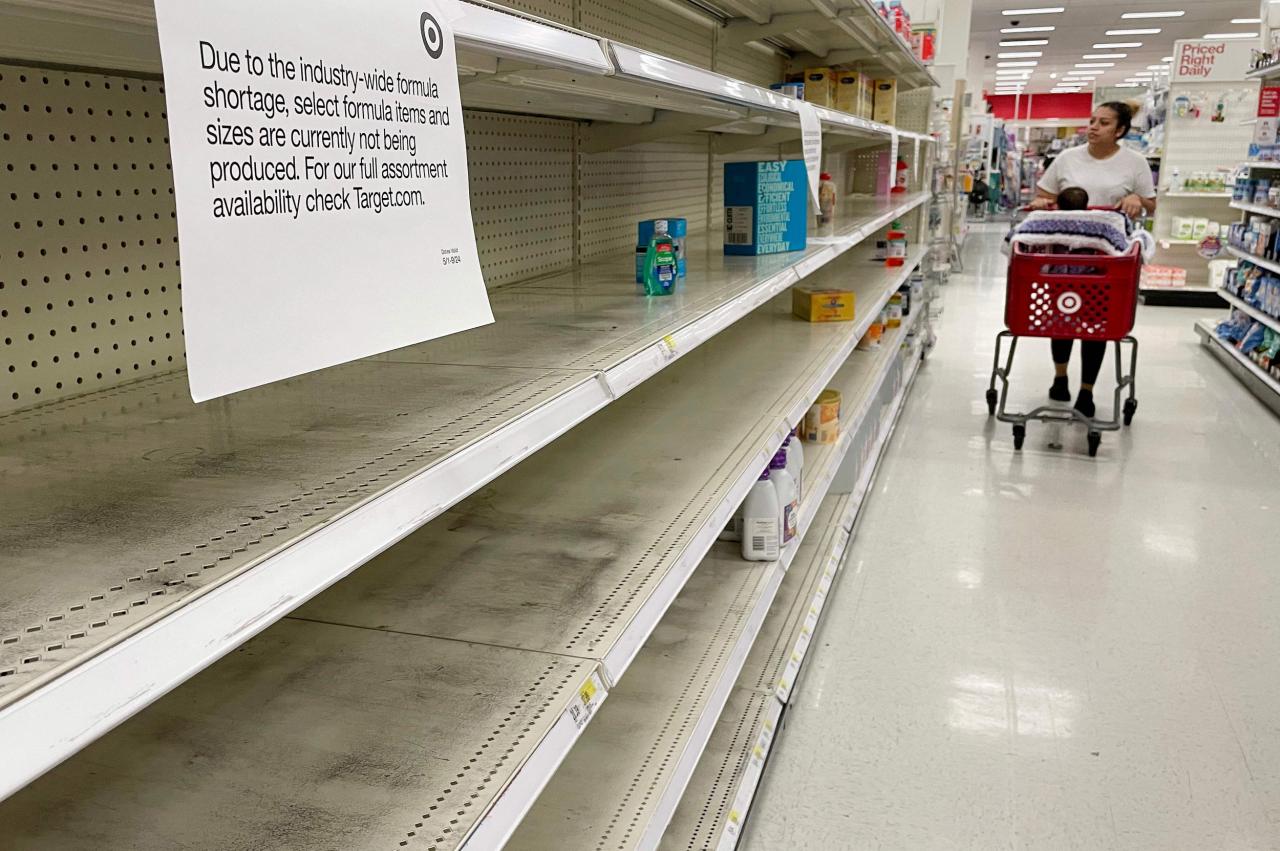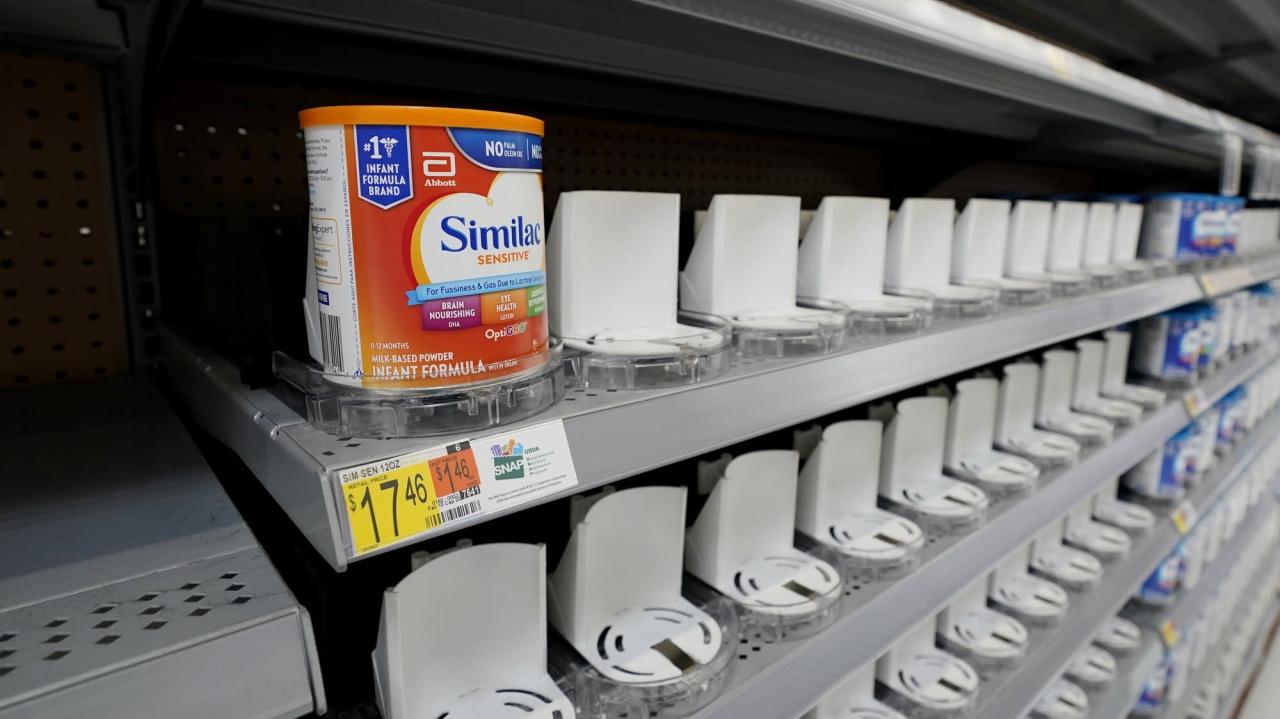
Baby Formula Shortage: An Aggravating Factor Few Producers Mention
Baby formula shortage has an aggravating factor few producers mention, and it’s not just about supply chain disruptions. The crisis is a complex web of issues, from regulations to safety concerns, all intertwined to create a perfect storm. It’s a story that affects families, communities, and the very foundation of infant nutrition.
The shortage has exposed vulnerabilities in our food system, highlighting the fragility of a single-source reliance on a few major manufacturers. The ripple effects are felt across the country, with parents desperately searching for formula, and healthcare providers struggling to meet the needs of their patients.
It’s a situation that demands a multifaceted approach, addressing not just the immediate crisis but also the underlying systemic issues that have contributed to it.
The Role of Supply Chain Disruptions

The baby formula shortage wasn’t just a result of increased demand; it was a complex problem exacerbated by a series of supply chain disruptions. These disruptions, many of which were triggered by the COVID-19 pandemic, created a perfect storm that led to empty shelves and frantic parents.The pre-pandemic supply chain for baby formula was relatively stable.
Manufacturers relied on a network of suppliers for raw materials, including milk powder, vitamins, and packaging. These materials were then processed and packaged into finished products, which were distributed through a network of retailers. However, the pandemic threw this system into disarray.
Impact of Factory Closures and Production Delays
The pandemic’s impact on factory closures and production delays was significant. The closure of a major Abbott Nutrition plant in Michigan, due to safety concerns and a subsequent recall, significantly reduced the supply of formula. This plant alone produced about 20% of the nation’s baby formula, leaving a massive void in the market.
The closure of other facilities due to labor shortages, supply chain bottlenecks, and COVID-19 outbreaks further exacerbated the problem.
The Regulatory Landscape and Safety Concerns
The baby formula shortage highlighted the intricate web of regulations governing formula production and safety. These regulations, while crucial for ensuring infant health, can also contribute to supply chain complexities and restrict formula availability.
Impact of Regulations on Formula Availability
The Food and Drug Administration (FDA) plays a pivotal role in regulating baby formula production and safety in the United States. The FDA’s stringent regulations, designed to safeguard infant health, can create hurdles for manufacturers. These regulations cover various aspects, including:
- Ingredient sourcing and quality control:The FDA mandates rigorous testing of ingredients used in formula, including milk, vitamins, and minerals. This ensures the safety and nutritional adequacy of the product. However, the rigorous testing and approval processes can lengthen the time required to introduce new products or source ingredients from new suppliers, potentially impacting supply.
- Manufacturing and processing:The FDA has strict regulations regarding formula manufacturing processes, including sanitation, equipment, and packaging. These regulations are essential for maintaining product quality and safety, but they can also add to the complexity and cost of production.
- Labeling and marketing:The FDA sets specific labeling requirements for baby formula, including nutritional information, ingredient lists, and warnings. These regulations ensure that consumers have access to clear and accurate information about the product, but they can also create challenges for manufacturers in adapting to changing labeling requirements.
The baby formula shortage has been a real struggle for families, and it’s aggravating that some producers haven’t been able to step up and meet the demand. To lighten the mood, I found this hilarious collection of 40 paws-itively hilarious dog jokes for kids that might make you chuckle.
It’s important to remember that while the formula shortage is a serious issue, laughter can be a great way to cope with stress. Hopefully, we’ll see a resolution to this situation soon, and families can find the formula they need for their little ones.
Safety Concerns and Formula Recalls
The FDA’s regulatory oversight has been instrumental in addressing safety concerns that have led to formula recalls and production halts. Several high-profile cases illustrate the impact of safety concerns on the formula market:
- Cronobacter sakazakii contamination:In 2022, Abbott Nutrition, a major formula manufacturer, faced a recall of several formula products due to contamination with Cronobacter sakazakii, a potentially fatal bacteria. This recall, prompted by investigations into several infant illnesses, significantly impacted formula availability and led to the temporary closure of an Abbott facility.
- Salmonella contamination:In 2021, another major formula manufacturer, Perrigo, recalled several products due to Salmonella contamination. The recall was prompted by reports of infant illnesses linked to the contaminated formula. This incident highlighted the importance of rigorous safety protocols and the potential for contamination to disrupt supply chains.
The baby formula shortage has been a real nightmare for parents, and it’s been frustrating to see how few producers seem to be able to step up and meet the demand. It makes you wonder if these companies have the leadership skills necessary to navigate such a crisis.
Maybe they could learn a thing or two from this article on 10 most important leadership skills for the 21st century workplace and how to develop them. Perhaps if they focused on adaptability and problem-solving, we wouldn’t be in this situation in the first place.
The FDA’s regulatory framework, while crucial for ensuring infant health, can create challenges for formula manufacturers, potentially impacting supply.
The Impact on Families and Communities: Baby Formula Shortage Has An Aggravating Factor Few Producers

The baby formula shortage has had a profound impact on families across the country, creating a sense of desperation and anxiety. The inability to find formula has forced parents to make difficult choices, often jeopardizing their own well-being and the health of their infants.
The shortage has also exposed vulnerabilities in the nation’s food supply chain and highlighted the critical role of community support and government assistance in times of crisis.
The baby formula shortage is a complex issue with many contributing factors, one of which is the lack of competition among producers. This lack of competition can lead to higher prices and less innovation, making it difficult for families to find the formula they need.
It’s interesting to think about how the Supreme Court, which has been transformed in recent years with the addition of Justice Jackson, a former law clerk, justice jackson a former law clerk returns to a transformed supreme court , might address issues like antitrust laws and their impact on consumer goods like baby formula.
Hopefully, the Court’s decisions will help to ensure that families have access to the essential products they need, like baby formula, at fair prices.
The Challenges Faced by Families, Baby formula shortage has an aggravating factor few producers
The shortage has created a multitude of challenges for families. Parents have spent countless hours searching for formula, driving from store to store, and resorting to online marketplaces where prices have skyrocketed. Many have had to rely on friends, family, and social media groups for support, sharing information about available formula and navigating the complex landscape of finding alternatives.
- Stress and Anxiety:The constant worry about finding enough formula has taken a toll on parents’ mental and emotional well-being. Many report feeling overwhelmed, stressed, and anxious about their ability to provide for their infants.
- Financial Strain:The shortage has led to increased costs for families, with some resorting to paying exorbitant prices for formula on the black market. This has placed a significant financial burden on many households, especially those already struggling to make ends meet.
- Sleep Deprivation:The lack of formula has disrupted sleep patterns for both parents and infants. Many parents have had to wake up multiple times during the night to find formula, leading to exhaustion and fatigue.
- Health Concerns:The shortage has also raised concerns about the health and safety of infants. Some parents have been forced to use formula that is not suitable for their child’s specific needs, potentially putting them at risk for nutritional deficiencies and other health problems.
The Future of Baby Formula Production
The baby formula shortage of 2022 exposed vulnerabilities in the US supply chain and highlighted the urgent need for a more resilient and diversified system. To prevent future shortages, a multi-faceted approach is necessary, focusing on increased domestic production, supply chain diversification, and enhanced regulatory oversight.
Solutions to Prevent Future Shortages
Several strategies can be implemented to address the vulnerabilities exposed during the recent shortage. These solutions aim to increase domestic production, diversify the supply chain, and strengthen regulatory oversight.
- Increase Domestic Production:Expanding domestic production capacity can reduce reliance on imports and create a more robust supply chain. This can be achieved by incentivizing domestic manufacturers to increase production, streamlining regulatory approval processes, and supporting research and development in infant formula production.
For example, the government could offer tax breaks or grants to companies that expand their production facilities or invest in new technology.
- Diversify the Supply Chain:Relying on a single source of supply is inherently risky. Diversifying the supply chain by increasing the number of manufacturers and suppliers can mitigate the impact of disruptions. This can be achieved by supporting smaller manufacturers, promoting competition, and fostering partnerships with foreign producers.
For example, the government could create a program to help small businesses enter the baby formula market or provide subsidies to manufacturers who source ingredients from multiple suppliers.
- Enhance Regulatory Oversight:Strengthening regulatory oversight can ensure the safety and quality of baby formula. This includes improving the inspection process, enforcing stricter safety standards, and enhancing communication between manufacturers and regulators. For example, the FDA could increase the frequency of inspections of manufacturing facilities and establish a more robust system for tracking and reporting safety incidents.
Improving Supply Chain Resilience
Building a more resilient baby formula supply chain requires addressing several key areas. This includes establishing strategic stockpiles, fostering partnerships, and promoting innovation.
- Establish Strategic Stockpiles:Maintaining a strategic stockpile of baby formula can provide a buffer against disruptions. This can be achieved by working with manufacturers to create a national reserve of formula, similar to the Strategic Petroleum Reserve. This stockpile can be accessed in emergencies to ensure a consistent supply of formula to families.
- Foster Partnerships:Building strong partnerships between manufacturers, suppliers, and retailers can improve communication and coordination. This can be achieved by creating a network of stakeholders who can share information and resources, enabling a more flexible and responsive supply chain. For example, the government could facilitate meetings between manufacturers and retailers to discuss potential disruptions and develop contingency plans.
- Promote Innovation:Investing in research and development can lead to new technologies and production methods that can improve the efficiency and resilience of the baby formula supply chain. This includes exploring alternative ingredients, developing more sustainable production processes, and improving packaging and distribution methods.
For example, the government could provide grants to companies that develop innovative solutions for infant formula production.
Different Approaches to Address the Issue
Various approaches can be taken to address the baby formula shortage, each with its own advantages and disadvantages.
| Approach | Advantages | Disadvantages |
|---|---|---|
| Increase Domestic Production | Reduces reliance on imports, creates jobs, supports domestic economy | Requires significant investment, may lead to higher prices, takes time to scale up |
| Diversify the Supply Chain | Mitigates risks of disruptions, promotes competition, enhances innovation | May increase complexity, requires careful coordination, may be challenging to implement |
| Enhance Regulatory Oversight | Ensures safety and quality of formula, builds consumer confidence, prevents future shortages | May increase costs for manufacturers, can be burdensome for small businesses, requires effective enforcement |
| Establish Strategic Stockpiles | Provides a buffer against disruptions, ensures access to formula in emergencies, promotes stability | Requires significant storage space, can be expensive to maintain, may lead to spoilage if not managed properly |
| Foster Partnerships | Improves communication and coordination, enhances flexibility, promotes collaboration | Requires trust and commitment from all stakeholders, can be time-consuming to build, may not be effective in the short term |
| Promote Innovation | Leads to new technologies and solutions, improves efficiency and sustainability, enhances competitiveness | Requires significant investment, can be risky, may take time to develop and implement |
Wrap-Up

The baby formula shortage is a stark reminder of the interconnectedness of our world and the need for a more resilient food system. While there are no easy solutions, a combination of proactive measures, including increased production capacity, diversification of suppliers, and improved supply chain infrastructure, can help prevent future crises.
The crisis has also highlighted the importance of government support and community initiatives in ensuring access to essential nutrition for all infants.






